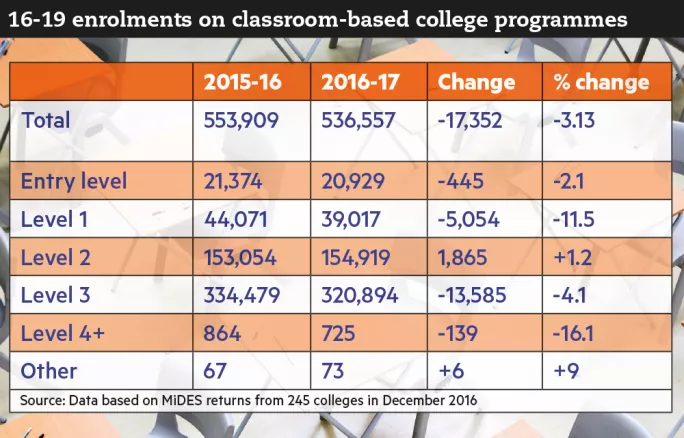FE’s £500m boost might fall short for T levels

The FE sector found itself in the spotlight this week, with one of the central planks of chancellor Philip Hammond’s Budget being the announcement of hundreds of millions of pounds in additional funding to support the Sainsbury review’s recommendations.
This could suggest either heroic productivity assumptions, small numbers on these routes or less funding for everything that still sits outside the 15 routes
The additional cash to fund the introduction of T levels - 16-19 qualifications aligned with the 15 technical routes outlined in the Post-16 Skills Plan - will gradually rise from £60 million in 2018-19 to £445 million in 2021-22, and eventually to “over £500 million” a year, according to the Treasury.
But senior figures in FE have questioned whether the funding will be sufficient to cover the cost of delivering T levels. The reforms will lead to the amount of training in the new qualifications being increased by over 50 per cent to more than 900 hours per year.
Student numbers squeeze
The sector also faces a reduced number of students in coming years. New figures, exclusively shared with TES by the Association of Colleges (AoC), reveal that the number of 16-19 college learners enrolled in 2016-17 was down by more than 17,000 on the previous year. Based on the average per-student funding calculated by the Institute for Fiscal Studies last month, this could result in college funding for next year dropping by more than £100 million across the sector.
Former AoC president John Widdowson told TES that 16-19 student numbers were expected to continue declining until 2020, with the reduced funding likely to put institutions under increasing pressure to balance the books at the same time as preparing for the new qualifications.
Across 245 English colleges, the number of classroom-based learners aged 16-19 enrolled decreased by more than 3 per cent between 2015-16 and 2016-17 (see table, below). The largest percentage drops were among level 1 students, at 11.5 per cent, and level 4 and above, at 16.1 per cent.

Matt Hamnett, principal of North Hertfordshire College, said it was impossible to judge how the additional funding would compare with the detailed cost implications of delivering the new qualifications.
“We should welcome the government’s commitment to the provision of high-quality full-time technical programmes, he added. “We should also, though, reserve our judgement on the financial settlement proposed until we see the real detail of the government’s proposals - the implications of which will likely, and rightly, be far reaching in terms of what further education colleges do and how.”
Andy Westwood, professor of further and higher education at the University of Wolverhampton, said that the funding rise was significantly less than the increase in teaching hours for T levels, adding: “This could suggest either heroic productivity assumptions, small numbers on these routes or less funding for everything that still sits outside the 15 routes.”
AoC assistant chief executive Julian Gravatt said the funding was for “courses still to be designed”, and that it was difficult to know whether the amount allocated would be sufficient to cover colleges’ increased costs.
“The issue on the falling number of students is going to be that you are going to get capacity being cut back in some places,” he said.
Need for Neets
John Widdowson, principal of New College Durham, said the drop in enrolments was largely down to demographic changes, but would threaten the “viability” of programmes at colleges across the country.
With extra investment, we hope that students and staff are able to learn and work under less pressure
“We have a diminishing demographic until 2019-20,” he said. “So we need to bring in more students from the Neet [not in education, employment or training] group, which we try to do, or take from other institutions.”
Shakira Martin, vice-president for FE at the NUS students’ union, said there was a possible link between the fall in college students and the government’s focus on apprenticeships.
“With extra investment, we hope that students and staff are able to learn and work under less pressure, ensuring that classroom-based vocational learning is of the high standard our sector is used to delivering,” she added. “This funding will by no means solve all the difficulties the further education sector is faced with, but it is certainly a welcome change after years of cuts.”
The Department for Education declined to comment.
You need a Tes subscription to read this article
Subscribe now to read this article and get other subscriber-only content:
- Unlimited access to all Tes magazine content
- Exclusive subscriber-only stories
- Award-winning email newsletters
Already a subscriber? Log in
You need a subscription to read this article
Subscribe now to read this article and get other subscriber-only content, including:
- Unlimited access to all Tes magazine content
- Exclusive subscriber-only stories
- Award-winning email newsletters